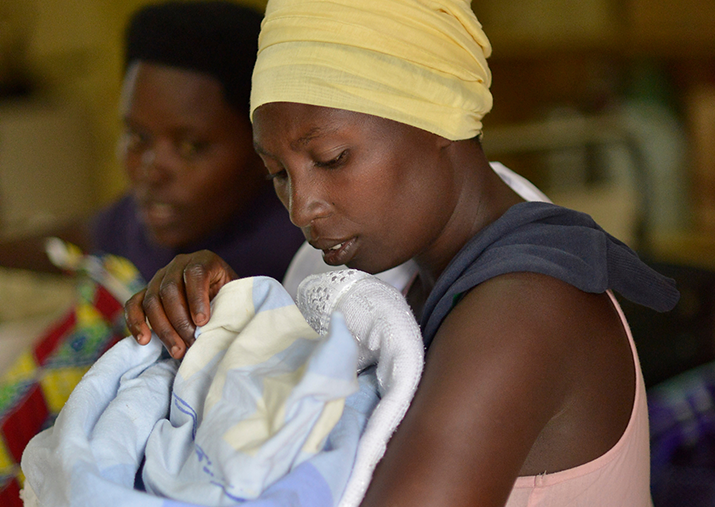Making C-Sections Safer: Reducing Surgical Infections in Rwanda
Making C-Sections Safer: Reducing Surgical Infections in Rwanda

Cesarean section (C-section) delivery, which is usually initiated when complications arise during pregnancy or delivery, is one of the most frequent surgeries performed at health facilities worldwide.
At Bushenge Provincial Hospital, a major referral hospital in the outermost region of Rwanda’s Western Province, approximately 48% of births each year are by C-section. Surgical site infections are a common complication after C-section procedures that do not follow infection prevention and control (IPC) principles. Such infections can be costly to treat and place a heavy physical, emotional, and financial burden on mothers and their families.
When a woman gives birth by C-section with no complications, she typically spends three days in the hospital so that doctors and nurses can monitor her and her baby before they go home. However, when a woman develops an infection at the site of the incision, she often experiences fever, discharge from the incision, and pain. She and her baby may spend as long as two weeks in the hospital as doctors treat the infection. The patient’s family must walk long distances every day to deliver meals to the mother during her stay.
As part of its strategy to improve the quality of health care services in the Rwandan health system, the Rwandan Ministry of Health established the National Healthcare Accreditation Program in 2012. Developed in partnership with the USAID-funded Rwanda Health Systems Strengthening (RHSS) Project, the accreditation program addresses five main areas for risk reduction: leadership processes and accountability, a competent and capable workforce, a safe environment for patients and staff, clinical care of patients, and improving quality of care and safety. The accreditation program began with five hospitals, including Bushenge Provincial Hospital, and has expanded to all 42 public hospitals in Rwanda.
The program directly addresses maternal and child health, among other critical health areas, and includes standards for the prevention of infections resulting from C-sections. With support from the RHSS Project, Bushenge Hospital developed and implemented patient-centered quality improvement policies, procedures, and protocols to ensure that hospital staff wash their hands frequently, sterilize equipment, monitor antibiotic prophylaxis, and ensure that patients have access to safe and adequate water.
The RHSS Project trained hospital staff on IPC and patient education so patients can actively mitigate the spread of postoperative infections. After each procedure, clinicians at Bushenge Hospital confirm that their patients know how to minimize the risk of post-Cesarean infection after leaving the hospital. Simple steps such as periodically cleaning the incision with clean water and wearing clean clothes can save a mother from the pain and anxiety associated with surgical site infections.
“Because of the Accreditation Program, I work with an objective and not just out of routine as I did before. I always ask myself ‘what can I do to contribute to the quality of care at Bushenge?’ If there is an infection risk, I ask myself, ‘what can I do to help?”
Noëlla Benemariya, Environmental Health Officer at Bushenge Provincial Hospital
As part of its accreditation journey, Bushenge Hospital leveraged simple, cost-effective, quality improvement techniques to create a safer environment and ultimately reduce the number of mothers developing infections after C-sections. After three years of implementing these quality standards, the hospital has successfully reduced the rate of mothers developing post-Cesarean infections from 8.0% in 2014 to 0.4% in 2019.
To safeguard and enhance the successes at Bushenge Hospital, the RHSS Project has supported the facility in establishing IPC and quality improvement committees that continue to steer Bushenge on its journey to full accreditation as a hospital that delivers high-quality, patient-centered care.